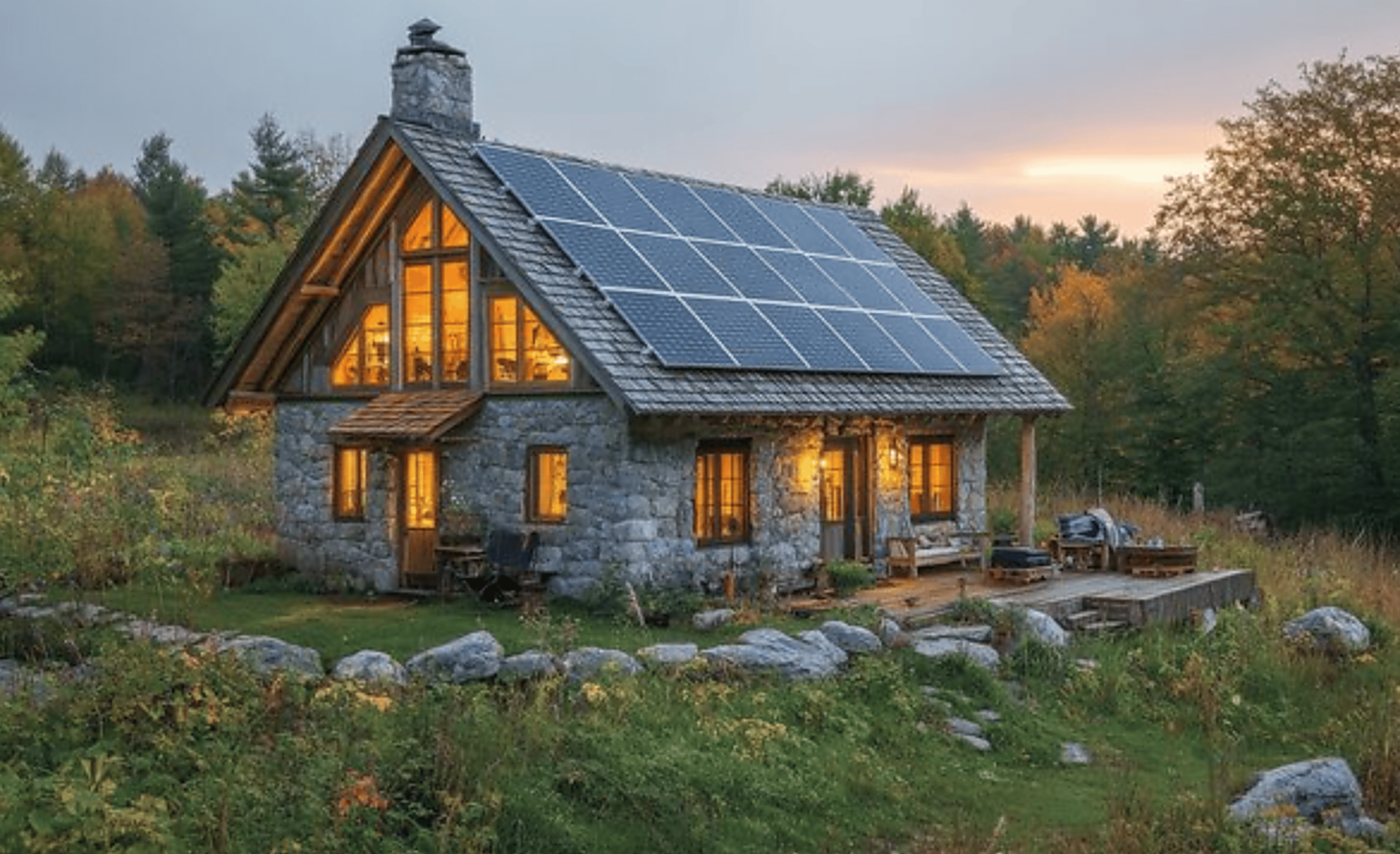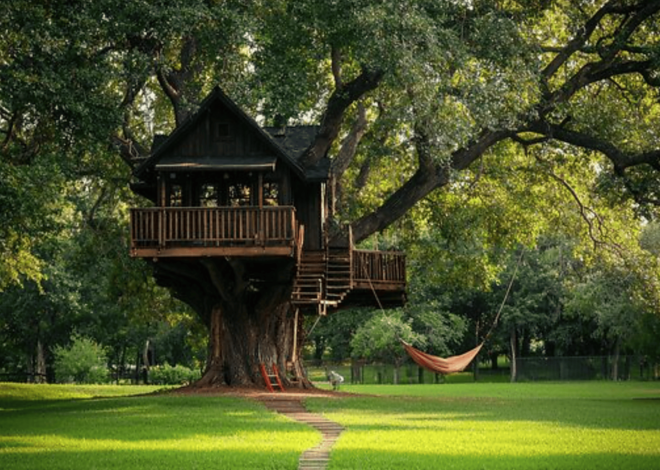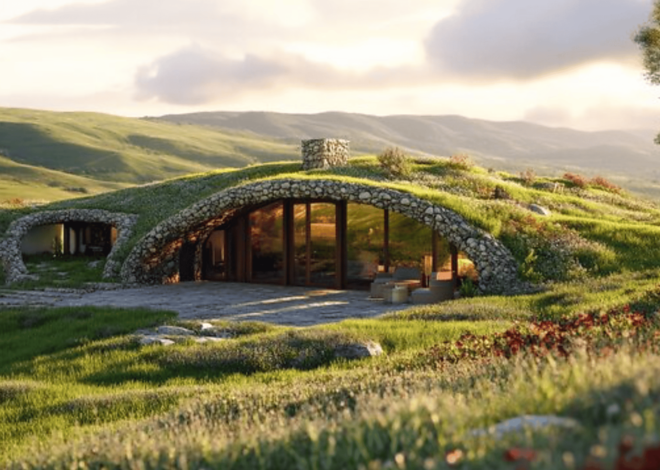
How To Build An Off The Grid House
Welcome to the ultimate guide on how to build an off the grid house. Imagine waking up to the sound of birds chirping, surrounded by nature, and knowing that your home is entirely self-sufficient. Off-the-grid living isn’t just a trend; it’s a lifestyle choice that many are embracing for various reasons.
Whether it’s a desire for freedom from utility bills, a commitment to sustainability, or simply an urge to reconnect with nature, building an off-the-grid house offers unique rewards and challenges. This way of life invites you into a world where resourcefulness reigns supreme and every decision impacts your environment directly.
If you’ve ever dreamed about taking this leap into independence while crafting your own sanctuary in the woods or on open plains, you’re not alone. Join us as we dive deep into how to build an off-the-grid house—a journey filled with creativity, practicality, and adventure awaits!
Benefits of Building an Off The Grid House
Building an off-the-grid house offers a unique lifestyle that many find liberating. You gain independence from utility companies, reducing monthly expenses and reliance on external resources. Living off the grid means embracing sustainability.
By utilizing renewable energy sources like solar or wind power, you contribute to environmental preservation while enjoying lower carbon footprints. Another benefit is the connection to nature. Off-the-grid living often places you in serene locations, allowing for relaxation and a simpler way of life away from urban chaos.
Moreover, it can foster self-sufficiency. Growing your own food and managing resources teaches valuable skills that promote resilience and adaptability in various situations. There’s unparalleled personal freedom. Designing your space according to your needs reflects individuality while minimizing distractions common in conventional lifestyles.
Things to Consider Before Building an Off-The-Grid House
Building an off-the-grid house requires careful planning. It’s not just about the structure itself; lifestyle changes come with it. Start by assessing your skills and resources. Are you handy with tools, or will you need professional help? Knowing your limits is crucial for a successful build.
Next, think about water access. A reliable source is essential for daily living. Consider rainwater harvesting or nearby streams. You’ll also want to plan for waste management. Composting toilets and greywater systems can be sustainable options but require research and maintenance.
Climate plays a significant role as well. Your design should accommodate local weather patterns, ensuring comfort year-round. Consider community ties. Being remote can feel isolating at times, so building relationships with neighbors might enhance your experience of off-grid life significantly.
Choosing the Right Location for Your Off The Grid House
Choosing the right location for your off-the-grid house is crucial. The ideal setting will support your lifestyle and needs. Consider factors like climate, accessibility, and proximity to resources. A sunny area can enhance solar energy production. Conversely, a site with ample water sources offers more sustainable living options.
Think about the local wildlife as well. Knowing what animals inhabit the area can help you plan better for food storage and garden protection. Evaluate soil quality if you’re planning on growing crops or raising livestock. Fertile land will make it easier to sustain yourself organically.
Reflect on how remote you want to be. Some prefer complete isolation, while others appreciate being near a small community for social interaction or emergency support. Choose wisely; this decision shapes your off-grid experience significantly.
Designing Your Off-The-Grid House
Designing an off-the-grid house is about more than just aesthetics. It’s essential to create a space that harmonizes with nature while maximizing functionality. Start by considering your lifestyle and daily needs. Determine how many rooms you require, the layout that suits you best, and spaces for energy-efficient systems like solar panels or rainwater collection.
Natural light plays a vital role in design. Large windows can enhance indoor warmth and reduce dependency on artificial lighting. Think about passive heating and cooling techniques through proper orientation of your home. Incorporate sustainable materials to minimize environmental impact. Reclaimed wood, straw bales, or earthbag construction are excellent choices.
Don’t forget outdoor living areas such as decks or gardens that promote self-sufficiency while encouraging a connection with the surrounding environment. A well-thought-out design will make off-the-grid living both comfortable and enriching.
Materials and Construction Methods for an Off The Grid House
Choosing the right materials is crucial for building an off-the-grid house. Sustainable options like reclaimed wood, straw bales, and earth bags are popular choices. They offer insulation benefits while reducing environmental impact.
For construction methods, consider techniques such as cob building or rammed earth. These methods use natural resources that blend well with the environment and provide excellent thermal mass. You might also explore tiny home designs or shipping container homes.
Both can reduce waste and optimize space without compromising comfort. Incorporating solar panels into your design not only enhances energy efficiency but complements modern aesthetics too. Rainwater harvesting systems made from simple gutters can ensure a sustainable water supply.
Always keep in mind local weather conditions when selecting materials to guarantee durability and longevity in your build. The goal is to create a functional yet harmonious living space that thrives independently from traditional utilities.
Sustainable Energy Sources for Off The Grid Living
Sustainable energy sources are the backbone of off-the-grid living. Harnessing nature’s power allows you to thrive independently. Solar panels are a popular choice. They capture sunlight and convert it into electricity, providing a reliable source of power for your home.
With advancements in technology, solar systems have become more efficient and affordable. Wind turbines offer another option. If you live in an area with consistent winds, they can generate substantial energy. Small residential turbines can effectively complement your solar setup.
Don’t overlook hydropower if you have access to flowing water. Even small streams can be harnessed to create energy through micro-hydroelectric systems. Biomass is also viable; recycled organic materials can be converted into fuel or used for heating purposes.
Exploring these options ensures that your off-the-grid house remains self-sufficient while respecting the environment’s balance.
Essential Supplies and Tools for Off The Grid Living
Living off the grid requires careful planning and the right supplies to ensure a sustainable lifestyle. Start with the basics: quality hand tools like shovels, axes, and saws are essential for construction and maintenance tasks.
Water is crucial. A reliable filtration system or rainwater collection setup will keep you hydrated. Don’t forget storage containers for food preservation—canning jars can be invaluable. Cooking without electricity? Consider a wood stove or solar oven for meals.
These options not only save energy but also provide warmth. Lighting is important too. Invest in solar-powered lights or LED lanterns to illuminate your space after dark seamlessly.
First aid kits should never be overlooked. Accidents happen, especially when working outdoors. Equip yourself well so that you can handle emergencies effectively while enjoying your new lifestyle.
The Cost of Building and Living Off-The-Grid
Building and living off-the-grid can be a rewarding venture, but it’s essential to understand the costs involved. Initial expenses vary widely based on location, design, and materials. For some, it may mean investing in solar panels or wind turbines; for others, it could involve sourcing sustainable building materials.
Don’t forget about ongoing costs too. Water purification systems and waste management must be factored into your budget. These necessities will ensure a comfortable lifestyle without relying on municipal services.
Additionally, consider potential land acquisition fees or utility connections if you choose hybrid options. The upfront investment might seem daunting, yet many find that reduced monthly bills lead to long-term savings.
Be prepared for unexpected expenses as well. Weather-related repairs or maintenance of energy systems can arise over time. Staying flexible with your financial planning is key to making this lifestyle work seamlessly.
Tips for Maintaining and Managing an Off The Grid Home
Maintaining an off-the-grid home requires a proactive approach. Start by regularly checking your solar panels and wind turbines for debris or damage. Clean them to ensure maximum efficiency. Water collection systems also need attention. Inspect gutters and filters frequently to prevent blockages.
A clean water source is essential for sustainable living. Keep track of your supplies, especially food and fuel. Rotate stock to avoid spoilage and replenish as needed. Create a schedule for routine maintenance tasks like inspecting insulation, plumbing, and electric systems.
This will help you catch small issues before they become big problems. Engaging with the local community can offer support too. Join groups focused on sustainable living; sharing tips and experiences can be invaluable. Always be prepared for unexpected challenges—keep tools handy for repairs or upgrades that may arise during your off-grid journey.
Permits and Regulations for Off-The-Grid Homes
Building an off-the-grid home isn’t just about creativity and self-sufficiency; it also involves navigating a maze of permits and regulations. Each locality has its own set of rules regarding land use, construction, waste disposal, and water sourcing.
Before you break ground, research local zoning laws. Some areas may have restrictions on what you can build or where you can place your home. Additionally, check for any required environmental impact assessments that could delay your project.
Obtaining the necessary permits is crucial to avoid fines or forced deconstruction later on. Depending on your location, this might include building permits as well as those related to septic systems or alternative energy sources like solar panels.
Staying informed helps in planning your budget and timeline effectively. Engaging with local authorities early in the process often leads to smoother sailing down the road when it comes to compliance and inspections.
Challenges and Solutions for Living Off The Grid
Living off the grid presents unique challenges that require innovative solutions. One of the most significant hurdles is managing water supply. Rainwater harvesting systems and deep wells can provide reliable sources, but they need regular maintenance.
Another common issue is energy storage. Solar panels are excellent for generating power, but without proper battery systems, you might find yourself short on electricity during cloudy days or winter months. Investing in high-capacity batteries can mitigate this problem effectively.
Wildlife encounters also pose risks to both crops and property. Fencing and natural deterrents help protect your garden from hungry animals while maintaining a harmonious balance with nature. Communication can be tricky as well due to limited internet access in remote areas.
Satellite phones or mobile hotspots offer alternatives that keep you connected when needed without compromising your off-grid lifestyle. Adapting to these challenges will enhance your experience living independently from conventional utilities.
Conclusion: Living in an Off-Grid House
Living in an off-grid house is a lifestyle choice that many are embracing today. It offers the allure of independence, self-sustainability, and a deeper connection to nature.
Building your own off-the-grid home allows you to tailor every aspect—from energy sources to design—to match your unique needs and ideals. Each decision contributes not only to your comfort but also supports environmental sustainability.
As you embark on this journey, remember that challenges may arise. However, with careful planning and preparation, these hurdles can often be transformed into opportunities for creativity and growth.
Living off the grid fosters a profound sense of fulfillment as you cultivate resilience and discover new skills along the way. Embracing this lifestyle means stepping away from conventional norms and diving into a world where simplicity reigns supreme—an adventure worth pursuing for those ready for change.







Hello Jack!
Your article on building an off-the-grid house is such a great guide for anyone dreaming of self-sufficiency! I love how you broke down the essentials like location, energy sources, and sustainable materials—it really paints a clear picture of what’s needed.
I’m curious, though, about managing unexpected challenges. For example, how do you recommend handling delays or cost overruns during construction? Also, have you found any clever ways to make off-grid living more affordable for beginners as I am hoping to convince my hubby this is the way to go for us?
Looking forward to hearing your thoughts—this is such an inspiring topic!
Angela M 🙂
Hello Angela,
Thank you so much for stopping by and sharing your thoughts on building and off the grid house. I’m also glad that you enjoyed the article and found the topic interesting. Most people in general want to be left alone which is impossible in an urban setting. This why the interest in off the grid living has sky rocketed in recent years.
Those that can afford this life changing event are going off grid in record numbers. However, living off grid is not for everyone. Especially for those that don’t possess basic survival skills. For those with minimal funds, going off grid will be more challenging but not impossible for those skilled enough to do it.
Building an off grid home is almost the same as building a conventional home. With that said, always expect the unexpected. Be prepared for cost overruns and delays. It’s best to go with the flow because it’s less stressful that way. After all, that’s the whole point of living off grid to begin with.
Please make sure you and your husband do your homework first.Living off the grid is unlike any other way of living. Even if you have unlimited financial resources. Things can go wrong in a hurry if you are not skilled, prepared and resourceful. Should you decide to go for it. Please come back and share your adventure with us. I’d love to hear all about it.
Best wishes and luck!
Hi Jack,
I found this article to be a fantastic resource for anyone aspiring to live off-grid. It highlights the many important considerations, such as waste disposal and securing reliable water sources. Ensuring you have sufficient emergency supplies and the ability to filter water is crucial for success. While this lifestyle isn’t something I plan to pursue, I admire the resilience and grit of those who do.
Best regards,
G
Hi Godwin,
Thanks for sharing your thoughts on how to build an off the grid house. Living off the grid is definitely not for everyone. It’s not as easy as some people think and you do have to give up some of the modern conveniences we all enjoy today. You can’t just run down to the local gas station to grab a pack of smokes and a gallon of milk.
So for those that want to live this type of lifestyle. There are lots of things to consider so I would suggest that anyone thinking about living off the grid. Do your homework and prepare for every possible scenario. Because your life will depend on it!
Best wishes,